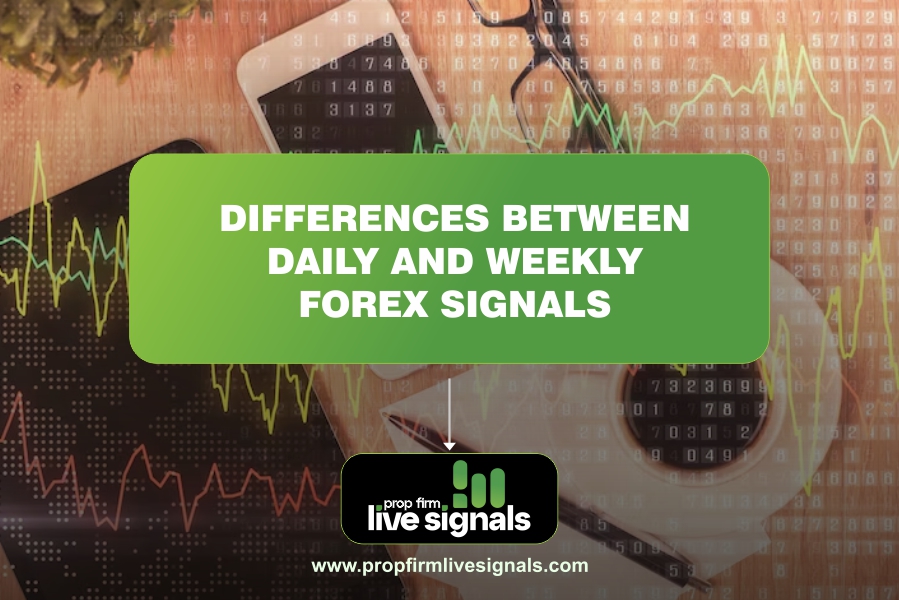Using forex signals, which offer practical insights into market movements, is one of their most useful tools. The two main categories into which these signals might be divided are daily and weekly signals.
A trader’s technique and overall success in the forex market can be greatly impacted by knowing the main distinctions between these two. This distinction is important because it affects risk management tactics, market analysis methods, trading frequency, and, eventually, trading results.
The intricacies of daily and weekly forex signals will be examined in this article, along with their definitions, methods of generation, benefits and drawbacks, and practical applications in trading systems.
Traders may match their signal usage to their unique trading goals and styles by developing a thorough awareness of these variations.
Understanding Forex Signals
Based on a variety of assessments, forex signals act as notifications that let traders know when to purchase or sell currency pairs. These signals can be produced using a variety of techniques, such as fundamental analysis, technical analysis, or a mix of the two.
Types of Forex Signals
- Manual Signals: These are created by skilled analysts who keep an eye on market conditions and make suggestions in light of their observations.
- Automated Signals: Produced without human involvement by algorithms that examine past data and present market situations.
Depending on the trader’s preferences, both kinds of signals can be customized for daily or weekly trading techniques.
Daily Forex Signals
Daily forex signals are characterized by their short-term nature. They are typically generated multiple times throughout the day and focus on immediate market conditions.
Characteristics of Daily Forex Signals
- Frequency: Depending on real-time data, these signals may be produced multiple times during the day.
- Timeframe: They often concentrate on transactions that take a few minutes to many hours to complete.
- Market Analysis: Technical analysis, which uses indicators like moving averages, RSI (Relative Strength Index), and candlestick patterns to determine entry and exit locations, is frequently a major component of daily signals.
Advantages of Daily Forex Signals
- Fast Decision-Making: Traders are able to profit on transient price changes.
- Greater Trading Volume: Possibilities for several trades in a single day may result in higher potential profits.
- Instant Feedback: Based on daily results, traders can rapidly evaluate how effective their tactics are.
Disadvantages of Daily Forex Signals
- Elevated Stress: Because everyday trading moves quickly, stress levels may rise.
- Increased Transaction Costs: Commissions and fees may rise as a result of frequent trading.
- Potential for Overtrading: The possibility of overtrading Traders may act impulsively due to the temptation of rapid profits.
Weekly Forex Signals
In contrast, weekly forex signals take a more measured approach to trading by focusing on longer-term trends.
Characteristics of Weekly Forex Signals
- Frequency: The frequency is usually once or twice a week.
- Timeframe: Trades could take a few days, weeks, or even months to complete.
- Market Analysis: To evaluate more general economic trends, weekly signals frequently combine technical indicators and fundamental analysis.
Advantages of Weekly Forex Signals
- Decreased Stress: With longer timescales, traders can make more thoughtful choices free from the stress of abrupt market swings.
- Reduced Transaction Costs: Commissions and fees are decreased when there are fewer trades.
- Pay Attention to Long-Term Trends: Traders might profit from notable price changes that take place over long stretches of time.
Disadvantages of Weekly Forex Signals
- Delayed Reactions: While waiting for longer-term trends to emerge, traders may pass on short-term possibilities.
- Possibility of Increased Risk Exposure: Traders who hold positions for extended periods of time may be subject to unforeseen market volatility.
- Less Feedback: The slower pace could make it more difficult to evaluate the efficacy of the technique right away.
Key Differences Between Daily and Weekly Forex Signals
Frequency:
- Daily Forex Signals: Multiple times per day.
- Weekly Forex Signals: Once or twice per week.
Timeframe:
- Daily Forex Signals: Minutes to hours
- Weekly Forex Signals: Days to weeks
Analysis Type:
- Daily Forex Signals: Primarily technical
- Weekly Forex Signals: Combination of technical & fundamental
Stress Level:
- Daily Forex Signals: High
- Weekly Forex Signals: Moderate
Transaction Costs:
- Daily Forex Signals: Higher due to frequent trades
- Weekly Forex Signals: Lower due to fewer trades
Profit Potential
- Daily Forex Signals: Quick gains possible
- Weekly Forex Signals: Potential for larger gains over time
Decision-Making Speed
- Daily Forex Signals: Rapid
- Weekly Forex Signals: More deliberate
Choosing the Right Signal Type
The choice between daily and weekly forex signals is mostly based on personal trading objectives and styles:
- Daily forex signals can be your greatest choice if you do well in hectic settings and are able to keep a careful eye on markets all day.
- On the other hand, weekly forex signals can be more appropriate if you would rather take a more laid-back strategy with fewer trades that enable a more thorough examination of market conditions.
Effective Strategies for Using Forex Signals
Regardless of whether you choose daily or weekly forex signals, employing effective strategies is essential for maximizing your trading success:
1. Combine Signal Types
A thorough understanding of market circumstances can be obtained by utilizing both daily and weekly indications. For example, a balanced strategy can be achieved by executing daily trades based on short-term swings and employing weekly indications for long-term positioning.
2. Implement Risk Management
Using risk management techniques like stop-loss orders is essential for safeguarding your money against unanticipated market swings, regardless of the type of indication.
3. Stay Informed
Staying up to date on events and economic news that may affect currency values can improve your ability to decipher the signals.
4. Techniques for Backtesting
Backtesting against previous data can assist in assessing a signal strategy’s efficacy under different market conditions before making a complete commitment.
Frequently Asked Questions (FAQs)
What is the primary difference between daily and weekly forex signals?
- The primary difference lies in their timeframe and trading approach. Daily forex signals focus on short-term trades, often generated multiple times a day, while weekly forex signals provide insights for longer-term trades, typically issued once or twice a week.
Who should use daily forex signals?
- Daily forex signals are ideal for active traders who prefer to engage in multiple trades throughout the day and can closely monitor market movements. This approach suits those looking to capitalize on short-term price fluctuations.
Who should use weekly forex signals?
- For traders who want a more laid-back approach, concentrating on wider market patterns and placing fewer trades over an extended period of time, weekly forex signals are more appropriate. For people who do not have the time to continuously watch the markets, this strategy is perfect.
What benefits come with utilizing daily forex signals?
- Fast decision-making, the possibility of increased trading volume, instant feedback on trading tactics, and chances to profit from transient market changes are some benefits of daily forex signals.
What drawbacks come with utilizing daily forex signals?
- The possibility of overtrading as a result of rash decisions motivated by short-term market conditions, higher transaction costs from frequent trading, and increased stress from quick decision-making are some drawbacks.




